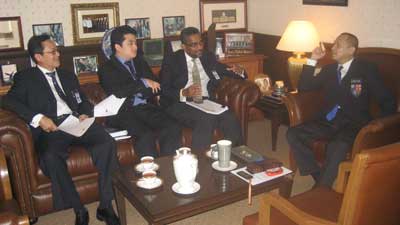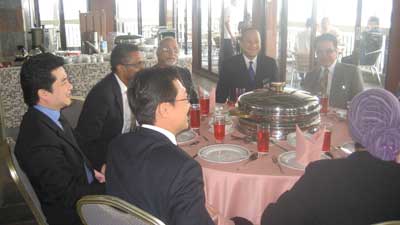Raja Petra, 59, is facing trial for the alleged seditious article entitled 'Let's send the Altantuya murderers to hell' which was posted on the Malaysia Today website.
 The charge under Section 4(1)(c) of the Sedition Act 1948 carries a maximum fine of RM5,000 or three years' jail or both upon conviction.
The charge under Section 4(1)(c) of the Sedition Act 1948 carries a maximum fine of RM5,000 or three years' jail or both upon conviction.Before the trial was adjourned in February, defence lawyer Gobind Singh Deo has raised the issue of an apparent photograph of Prime Minister Najib Abdul Razak seated at the table with murdered Mongolian woman Altantuya Shaariibuu during her birthday party in the Mandarin Hotel in Singapore.
Raja Petra is facing another charge for criminal defamation in Kuala Lumpur Sessions Court for allegingly implicating Najib's wife, Rosmah Mansor, and two army officers in the murder of Mongolian national Altantuya Shaariibuu.
The popular blogger's problem does not end there.
Last year, the Alor Star High Court has ordered him and editors of an opposition newspaper to pay damages over libel claims by a university head.
University Utara Malaysia and its vice-chancellor Nordin Kardi filed a lawsuit against Raja Petra over an item that alleged Nordin had plagiarised an article.The High Court made the decision after Raja Petra and the opposition party PKR's newspaper, which also published the story, failed to file a defence.
It ordered Raja Petra to pay RM4 million to Nordin and the university, while two editors of Suara Keadilan had to pay RM3 million.
Raja Petra said the offending item was merely a letter written to him by a former student representative and that he would not pay the compensation.
-------------------------------------------------------------------------------------------
Why I was not in court today
After two rounds of detention under the Internal Security Act, controversial blogger Raja Petra Kamaruddin said he does not wish for a third. In a posting on his Malaysia Today website, the popular 59-year-old cigar-smoking writer of aristocratic lineage explains why he skipped today's sedition trial hearing.
In a posting on his Malaysia Today website, the popular 59-year-old cigar-smoking writer of aristocratic lineage explains why he skipped today's sedition trial hearing.
"After two ISA detentions, I do not plan to allow them to get me so easily the third time around.
"I also refuse to face treason charges that will result in me being sent to the gallows. I love my life and wish to remain alive a few years longer if possible," he said.
Raja Petra is facing trial for the alleged seditious article entitled 'Let's send the Altantuya murderers to hell' which was posted on the Malaysia Today website.
There are also rumours that the blogger, who has been one of Prime Minister Najib Abdul Razak's staunchest critics, might have left the country with his wife. However, this could not be confirmed.
Over the years, Raja Petra's 'no holds barred' style of writing has earned him both admiration and condemnation.
Royal conflict
At the same time, the blogger said that his absence from court was also related to his recent dispute with the Selangor palace.
"This dispute was due to my open letter to the (ousted) Perak menteri besar Mohd Nizar Jamaluddin, which I wrote on March 2 in response to the ongoing Perak constitutional crisis.
"My family (his royal cousins) said I had acted in a treasonous manner and they wanted me to issue a public apology to the Sultan of Perak," he added.
However, Raja Petra refused to do so.
"The Sultan of Selangor was very angry and that triggered a conflict between our two families. My family told me I had brought shame to the family name and they demanded that I attend a family meeting to discuss the matter. However, I did not attend and this aggravated the situation.
"My family then gave me an ultimatum. I was to either make that public apology or else my family would insert an advertisement in the mainstream newspapers practically distancing itself from me, which could be interpreted as disowning me," he penned.
According to Raja Petra, he has opted to go into a self-imposed exiled outside the state of Selangor - a "punishment befitting a member of the Selangor royal family who has courted the displeasure of the palace".
He said his grandfather Sultan Musa had suffered the same fate, and that was why the controversial blogger could not be in Petaling Jaya court today.
Below is the full text of his blog posting
I wish to explain why I am not present in court today. Firstly, it involves my recent dispute with the Selangor palace. This dispute was due to my open letter to the Perak Menteri Besar Mohd Nizar Jamaluddin, which I wrote on March 2 in response to the ongoing Perak constitutional crisis. My family said I had acted in a treasonous manner and they wanted me to issue a public apology to the Sultan of Perak.
I refused to comply with my family’s demand and instead wrote two articles condemning the Perak palace for violating the federal constitution and for ignoring the wishes of the rakyat. My opinion is no different from that of NH Chan, the former Court of Appeal judge. The Sultan of Selangor was very angry and that triggered a conflict between our two families. My family told me I had brought shame to the family name and they demanded that I attend a family meeting to discuss the matter. However, I did not attend that family meeting and this aggravated the situation.
The Sultan of Selangor was very angry and that triggered a conflict between our two families. My family told me I had brought shame to the family name and they demanded that I attend a family meeting to discuss the matter. However, I did not attend that family meeting and this aggravated the situation.
My family then gave me an ultimatum. I was to either make that public apology or else my family would insert an advertisement in the mainstream newspapers practically distancing itself from me, which could be interpreted as disowning me.
My response to that was, and in accordance with the normal action to be taken against a member of the ‘kerabat’ (royalty) who has ‘derhaka’ (committed treason), I went into exile outside Selangor. As a matter of fact, I even missed two recent family funerals as I could not, and would not, step foot in Selangor ever again.
It has to be noted that this has always been the punishment for any member of the Selangor royal family who is considered derhaka since the beginning of the Selangor sultanate more than 250 years ago. My grandfather, Sultan Musa, was in fact subjected to that same punishment and it is the only punishment befitting a member of the Selangor royal family who has courted the displeasure of the palace.
This means, in short, I can no longer attend the court hearing as this is heard in Petaling Jaya, which is invariably within the state of Selangor.
Punished twice for the same crime
The second reason is as follows:
In September 2008, I was detained under the Internal Security Act for what I was alleged to have written regarding the Altantuya murder and the alleged links to those who walk in the corridors of power. However, I am already facing trial on sedition and criminal defamation charges in this court as well as in the Kuala Lumpur court.
Now, my ISA detention in September 2008 was for the same crime as what I have been charged in this court (sedition) and in the Kuala Lumpur court (criminal defamation). This means I am being punished twice for the same crime, and the law does not provide for one to be punished twice for the same crime.
No doubt, in November 2008, the Shah Alam court ruled my detention illegal and subsequently ordered my release. Nevertheless, the government is appealing this decision, giving a clear indication that it wants me back in Kamunting whereby I will face punishment without trial on top of the two trials I am being made to face - which, as I said, are for those same crimes.
The events of late do not give me any confidence that I will get a fair trial. Even if the Petaling Jaya court acquits me, they can still appeal the decision of the court like what they are doing with the Shah Alam court’s decision to free me from ISA detention. And the manner the Federal Court conducted itself during the recent ISA appeal hearing is very troubling indeed and borders on unprofessional conduct.
Finally, my open letter to Nizar has been classified as treason and the government wants to charge me for that. The fact that no such law exists will not stop them as they can use the ‘waging war against the King’ law that they used against some of the Al Maunah members, which resulted in them being hanged in Sungai Buloh prison in October 2006.
Many of my friends have spotted police vehicles parked outside their house. Others have noticed police officers loitering in front of their residence while some have been summoned to Bukit Aman for interrogation. The police want them to reveal where I am currently residing.
Why are the police looking for me? Two months ago, the Federal Court was in a hurry to hear the appeal against my release from ISA detention. After impatiently rejecting all our applications and refusing to allow us time to file the necessary papers, the court suddenly went cold and nothing was heard from it since.
This got me very suspicious. I did some checking and have reason to believe that a new detention order has been issued and that is why the police are looking for me. If I were to turn up in court today I would never be allowed to leave. The police would immediately detain me and send me to Kamunting and this time I shall not be so fortunate as to see freedom in two months like in the last two occasions.
After two ISA detentions, I do not plan to allow them to get me so easily the third time around. I also refuse to face treason charges that will result in me being sent to the gallows. I love my life and wish to remain alive a few years longer if possible.
Those are the reasons I am not in court today. I shall, however, attend the court hearing when the situation permits, i.e, I am no longer to be charged for treason and I get an assurance from the powers-that-be that the government’s appeal against my ISA release is withdrawn forthwith and that no new detention order has been issued.
After all, if the Abdul Razak Baginda acquittal was not appealed upon, why am I being treated differently?
Raja Petra Raja Kamarudin



 The suit will be filed at the Kuala Lumpur High Court, said Gobind's father Karpal Singh.
The suit will be filed at the Kuala Lumpur High Court, said Gobind's father Karpal Singh. He added that Gobind was subjected to double jeopardy with a very harsh second punishment although he had earlier been punished by the deputy speaker Ronald Kiandee with a one-day suspension.
He added that Gobind was subjected to double jeopardy with a very harsh second punishment although he had earlier been punished by the deputy speaker Ronald Kiandee with a one-day suspension.

 "As part of the measures to develop Malaysia as an international Islamic financial hub, the legal profession will be liberalised to allow up to five top international law firms with expertise in international Islamic finance to practice in Malaysia," said Najib.
"As part of the measures to develop Malaysia as an international Islamic financial hub, the legal profession will be liberalised to allow up to five top international law firms with expertise in international Islamic finance to practice in Malaysia," said Najib.




